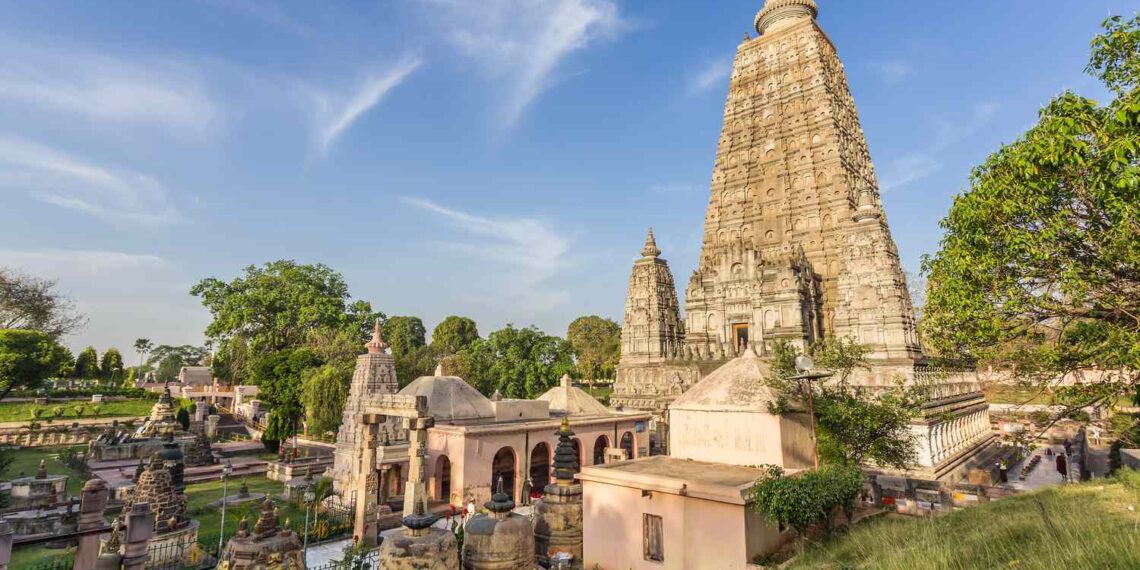Bihar, a state steeped in history and faith, is home to temples that carry stories of devotion and tradition. From Patna’s busy riverbanks to Rajgir’s quiet hills, each temple has a unique past and rituals. This blog covers 21 key temples in Bihar, India, sharing their real history, structure, customs, and special traits.
Mahabodhi Temple, Bodh Gaya
In Bodh Gaya, 12 km from Gaya, Mahabodhi Temple marks where Gautama Buddha attained enlightenment in 623 BCE. Built by Emperor Ashoka in the 3rd century BCE, its 55-meter brick tower has lotus carvings and is a UNESCO World Heritage Site. Monks chant Pali prayers at 5 AM, and visitors tie red threads to the Bodhi Tree, a descendant of the original.
Patan Devi Temple, Patna
In Patna’s Gulzarbagh, Patan Devi, a Shakti Peeth, has two shrines: Bari and Chhoti Patan Devi. Dating to the Gupta period, its idols are believed to be self-manifested. During Navratri (October), women offer red chunaris. Locals claim the goddess protected Patna during 1934 floods.
Vishnupad Temple, Gaya
By the Falgu River in Gaya, Vishnupad Temple honors Vishnu with a 40 cm footprint in basalt stone. Built in 1787 by Queen Ahilyabai Holkar, its octagonal dome is 30 meters tall. During Pitru Paksha (September), families offer rice balls for ancestors, led by priests from 6 AM. The temple, open 6 AM to 7 PM, has a banyan tree where devotees pray.
Mundeshwari Temple, Kaimur
On Mundeshwari Hill, 102 km from Sasaram, this 108 CE Durga temple is India’s oldest functional shrine. Its octagonal sanctum holds a four-faced Shiva lingam. Devotees offer coconuts during Navratri, tying threads to a tamarind tree. ASI-protected carvings date to the Gupta era.
Thai Monastery, Bodh Gaya
Built in 1956 by Thailand’s government, this monastery, 12 km from Gaya, has a golden spire and murals of Buddha’s life. Monks clean the lotus pond at 6 AM. During Vesak (May), devotees light incense, walking on marble floors. Open 7 AM to 6 PM, it’s a calm spot near Bodh Gaya’s main temple, reachable by rickshaw from Gaya station.
Mangla Gauri Temple, Gaya
On Shakti Peeth Hill in Gaya, this Durga temple, dating to the 15th century, has a black stone idol. Women tie yellow threads for fertility during Navratri. A 19th-century flood story credits villagers with saving the idol. Oil lamps are lit at 6 PM, and the temple, open 5 AM to 8 PM, is reached by 100 steps from Gaya’s Vishnupad.
Baidyanath Temple, Deoghar
One of 12 Jyotirlingas, Baidyanath, 8 km from Jasidih station, has a black lingam linked to Ravana in the Ramayana. Rebuilt in 1596 by Raja Man Singh, it draws 5 million during Shravan (July-August) for Ganges water offerings. Bells ring at 6 PM aarti, and milk is poured on the lingam.
Hariharnath Temple, Sonepur
On the Gandak River, 25 km from Hajipur, this 11th-century temple has a Vishnu-Shiva idol. Its Sonepur Cattle Fair, held in November, is Asia’s largest. At Kartik Purnima, devotees float diyas at 6 PM. Open 5 AM to 8 PM, it’s tied to local beliefs about cattle blessings, with flower stalls outside.
Thave Mandir, Gopalganj
In Thave, 36 km from Siwan, this Durga temple’s idol was found in a field in the 18th century. Rebuilt in 1820, it hosts Bhojpuri songs during Durga Puja (October). Farmers offer coconuts, and the mud-brick shrine, open 6 AM to 7 PM, has marigold stalls.
Aranya Devi Temple, Arrah
In Arrah, 60 km from Patna, this Durga temple, rebuilt in 1805 after Mughal damage, has a red-smeared idol. Devotees tie bangles for luck during Navratri. Stone carvings from the 18th century show Durga’s battles.
Shitla Mata Temple, Patna
Near Agam Kuan, a 3rd-century BCE well in Patna, Shitla Mata Temple fights disease with a 17th-century idol. On Shitla Ashtami (March), devotees offer curd. Open 6 AM to 7 PM, women sweep the yard at dawn. It’s 2 km from Patna Junction, tied to Ashoka’s era.
Singheshwar Sthan, Madhepura
In Madhepura, 80 km from Saharsa, this Shiva temple’s lingam dates to the 10th century. Rebuilt in 1650, it sees bel leaf offerings on Shivratri (February). Its pond, used for rituals, stays full, locals say.
Ajgaivinath Temple, Sultanganj
On the Ganges, 25 km from Bhagalpur, this 15th-century Shiva temple’s lingam is tied to Ravana. During Shravan, devotees carry water to Deoghar, chanting “Bol Bam.”
Baba Garibnath Temple, Muzaffarpur
In Muzaffarpur, 70 km from Patna, this Shiva temple’s lingam was found in a forest in 1750. During Shravan, milk is poured on the stone, believed to heal.
Kapileshwar Sthan, Darbhanga
In Darbhanga, 50 km from Madhubani, this Shiva temple, named for sage Kapila, has a 6-foot lingam from the 12th century. Rebuilt in 1850, it shines with lamps on Shivratri. Threads are tied to a banyan for peace.
Viraat Ramayan Mandir, East Champaran
Under construction in Kesaria, 50 km from Motihari, this Rama temple, started in 2018, aims to be the largest Ramayana site. Its 33-acre plot will have a 108-foot Rama statue.
Simri Mai Temple, Buxar
In Simri, 20 km from Buxar, this Durga temple’s idol was found in 1800. During Navratri, sugarcane is offered. Mud-brick walls are repainted yearly.
Sita Kund, Sitamarhi
In Sitamarhi, 65 km from Muzaffarpur, Sita Kund marks Sita’s birthplace with a 16th-century pond for ancestor rites. Ramayana murals were added in 1900. On Vivah Panchami (December), couples offer lotuses.
Parasnath Temple, Rajgir
On Vaibhav Hill, 25 km from Nalanda, this 10th-century Jain temple honors the 23rd Tirthankara with a marble idol. Devotees climb 1,200 steps. Open 7 AM to 5 PM, it’s 2 km from Rajgir station, offering views of green valleys.
Janki Temple, Janakpur (Nepal, near Bihar)
In Janakpur, 50 km from Sitamarhi, this 1910 temple honors Sita with Mughal domes and Ramayana murals. Bihari devotees join Vivah Panchami reenactments.
Ashokan Pillar Temple, Vaishali
In Vaishali, 55 km from Patna, this Vishnu temple, near Ashoka’s 3rd-century BCE lion pillar, has a 17th-century idol. Lotus flowers are offered in pond. Open 6 AM to 6 PM, it’s 2 km from Vaishali station, tied to Buddhist history.











